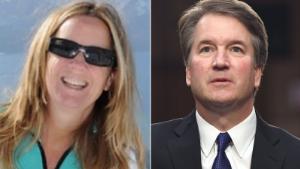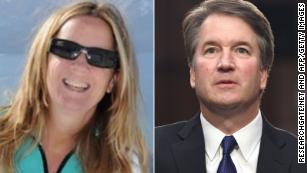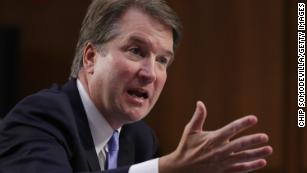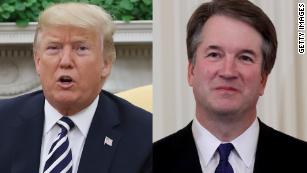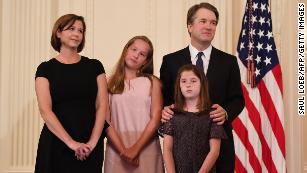Kavanaugh's accuser made her move -- now Republicans have to choose
Republican leaders are preparing a controversial push to install Brett Kavanaugh on the Supreme Court after a frenetic night of legal and political maneuvering in Washington that could reverberate for years to come.
In a major twist to his confirmation saga, attorneys for Christine Blasey Ford, who has accused Kavanaugh of sexually assaulting her when they were teenagers in the 1980s, said their client was not prepared to testify in a public hearing offered by Republicans unless the FBI first investigates her allegations. Kavanaugh has categorically rejected the claims.
Ford's decision, conveyed in a letter to Senate Judiciary Chairman Chuck Grassley of Iowa, obtained by CNN, raises the political stakes for Republicans and Democrats however they choose to respond.
Early signs are that the GOP will press on and try to get Kavanaugh confirmed, effectively bypassing Ford's demands for an investigation by arguing that they offered her the opportunity to testify and she did not take the chance to have her case heard.
"The invitation for Monday still stands," Grassley said in a statement.
Kavanaugh accuser wants FBI investigation before testifying
"Dr. Ford's testimony would reflect her personal knowledge and memory of events," he said. "Nothing the FBI or any other investigator does would have any bearing on what Dr. Ford tells the committee, so there is no reason for any further delay."
Sen. Bob Corker of Tennessee, another Republican who had wanted to hear from Ford before voting, tweeted: "Republicans extended a hand in good faith. If we don't hear from both sides on Monday, let's vote."
Sen. Lindsey Graham, a South Carolina Republican who sits on the Judiciary Committee, also pushed for a panel-wide vote "as soon as possible."
"Requiring an FBI investigation of a 36-year-old allegation (without specific references to time or location) before Professor Ford will appear before the Judiciary Committee is not about finding the truth, but delaying the process until after the midterm elections," Graham said in a statement Wednesday morning, adding, "It is imperative the Judiciary committee move forward on the Kavanaugh nomination and a committee vote be taken as soon as possible."
And President Donald Trump, adding to GOP momentum building behind Kavanaugh, made clear in a pre-midnight tweet his view that it was time to move on and accused Democrats of exploiting Ford's claims for political reasons.
"The Supreme Court is one of the main reasons I got elected President. I hope Republican Voters, and others, are watching, and studying, the Democrats Playbook," he tweeted.
A quick confirmation vote would satisfy those Republicans who see her eleventh hour challenge to Kavanaugh's candidacy as a Democratic delaying tactic, and it would please the party's activist base that is dedicated to the cause of cementing a conservative majority on the Supreme Court.
Yet it could expose the GOP to claims it is not willing to initiate a fair process to honor a woman's accusations against a powerful man -- a potential risky course in the political climate of the #MeToo era. Such a plan could also further damage Republicans in midterm elections in which they are already deeply unpopular with female voters.
To avoid such charges, Grassley and Senate Majority Leader Mitch McConnell, a Kentucky Republican, could decide to permit some kind of investigation into Ford's claims that a drunken Kavanaugh assaulted her at a house party in the Washington suburbs more than three decades ago.
But that path would delay Kavanaugh's confirmation, possibly for weeks, and leave open the possibility that it could be stalled completely. It would likely also frustrate Trump, who is taking pains to avoid showing his anger on such a politically sensitive issue.
A battle for leverage
In effect, Ford and the Senate Republicans are engaged in a battle for leverage and the moral high ground, a drama that encapsulates many of the undercurrents of power and gender politics that have rocked the United States during the Trump administration.
In her letter, Ford's lawyers said she had already faced the kind of backlash she had feared when she agonized about coming forward, after making anonymous allegations against Kavanaugh in July. In fact, her life has been "turned upside down," they said.
The letter said Ford was prepared to work with Grassley's staff about "reasonable steps" that could be taken to solve the standoff.
Kavanaugh hearing uncertain for Monday as accuser wants FBI to investigate before hearing
"She will talk with the committee. She is not prepared to talk with them at a hearing on Monday," one of her lawyers, Lisa Banks, said on CNN's "Anderson Cooper 360."
"No ... legitimate investigation is going to happen between now and Monday," she said. "This is going to take some time. There shouldn't be a rush to a hearing here."
That position is unacceptable to at least one key Republican senator on the Judiciary Committee, Orrin Hatch of Utah.
"Chairman @ChuckGrassley has moved our committee vote to accommodate Dr. Ford's lawyer's offer on TV yesterday to have her client testify before the Judiciary Committee," Hatch wrote in a tweet.
"We should proceed as planned."
Carrie Severino, chief counsel at the Judicial Crisis Network, argued that Ford's letter was another example of Democratic Party-inspired attempts to stall Kavanaugh's nomination.
"I think what we have seen here is a pattern of delay. This seems to be a moving of the goalposts again," Severino told CNN's Anderson Cooper.
"Sen. Grassley has bent over backwards to offer every possible thing they want."
What happens next?
Republicans on Capitol Hill must now decide how things will play out before Monday and whether to go ahead without Ford, possibly to take testimony from Kavanaugh that he has said he is keen to give.
Some Republicans have said that is the course they prefer.
"She's got a chance to come -- we run the committee, not her lawyer, not the Democrats," Sen. Lindsey Graham of South Carolina said earlier on Tuesday.
5 big questions about the Kavanaugh hearing
Sen. John Cornyn of Texas said, also before Ford's move, that she was "not really in a position to make conditions."
The problem for Republicans is such talk risks coming across as bullying by powerful men of a woman who is making serious accusations -- the kind of narrative that has been at the center of the #MeToo awakening.
But if Graham, Cornyn and Corker get their way, Kavanaugh could be on the way to confirmation -- if the narrow GOP majority holds firm.
The key reaction may come from Sen. Jeff Flake of Arizona, who has said he won't vote to confirm Kavanaugh without hearing from Ford. It was not immediately clear how her new position might change that.
Republican Sens. Susan Collins of Maine and Lisa Murkowski of Alaska are also crucial to Kavanaugh's confirmation hopes, so they will wield considerable influence in how the GOP leadership goes forward.
Women hold the key to Kavanaugh -- and maybe control of Congress
Yet Republicans will also listen to their base. A conservative Supreme Court is so vitally important to GOP activists -- and to the President -- they may opt to go ahead anyway, even at the risk of exacerbating damage in the midterm elections.
After choosing Trump as President, Republican voters have also shown they are willing to put cherished ideological goals ahead of concerns about sexual harassment. After all, multiple women have accused Trump of sexual misconduct, despite his denials.
A potential middle course would be for the GOP to ask the President to initiate an FBI investigation or an extended background check of Kavanaugh to look into Ford's allegations.
A compromise might see a committee investigation rather than one conducted by the FBI. Banks said that could be an option but stipulated it should be run by "impartial investigators who are not partisan."
Kavanaugh also has a choice -- along with his handlers in the White House. After all, Ford has said she is willing to submit to the full scrutiny of an FBI investigation -- not a step typically taken by someone who is not confident in their story. Is Kavanaugh willing to expose himself to that same standard?
Additionally, he might consider the implications to his credibility and reputation of being elevated to the Supreme Court -- where he will likely face consequential cases that deal with women's health, including abortion -- without Ford's allegations being resolved.
So far, there have been no calls for a rethink about his candidacy. But a prolonged impasse could prompt some conservatives to quietly talk about whether it might be easier to confirm another strong, perhaps female, conservative from Trump's list.
Democrats quickly rallied around Ford on Tuesday night, potentially validating claims they are exploiting the situation for political gain.
There were swift reactions from Sen. Kamala Harris of California, a possible 2020 presidential candidate, and the 2016 nominee, Hillary Clinton.
Senate Minority Leader Chuck Schumer, a New York Democrat, said in a statement that "Republicans and the White House should drop their inexplicable opposition to an FBI investigation, allow all the facts to come out, and then proceed with a fair process in the Senate."
In a purely political sense, Democrats are in a strong position whatever happens -- though the ultimate victory will be Trump's, given the likelihood of a generational conservative majority on the court.
If the Republicans press on and Kavanaugh is confirmed despite the allegations, Democrats have an issue that will inflame the liberal base in November. If they can engineer a delay, there is just the chance that they can stall his momentum and frustrate Trump's top political priority.
News Courtesy: www.cnn.com

